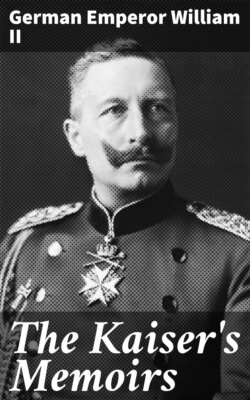Читать книгу The Kaiser's Memoirs - German Emperor William II - Страница 15
На сайте Литреса книга снята с продажи.
VICTORIA'S HAND IS FELT
ОглавлениеTable of Contents
After consultation with Prince Bismarck, Herr von Lucanus from the Ministry of Public Worship and Instruction, was appointed chief of the Civil Cabinet. Prince Bismarck observed jokingly that he was pleased with this choice, since Herr von Lucanus was known to him as an able and enthusiastic huntsman, which was always a good recommendation for a civilian official; he added that a good huntsman was a regular good fellow. Herr von Lucanus took over his post from His Excellency von Wilmowski. He discharged his duties admirably and, being well endowed in all pertaining to art, technical matters, science, and politics, he was to me a counselor, untiring collaborator, and friend. He combined with a healthy knowledge of men a strong dash of refined humor, which is so often lacking in men of the Germanic race.
With Prince Bismarck I had stood on very good and trustful terms ever since my assignment at the Foreign Office. Then, as well as before, I revered the powerful Chancellor with all the ardor of my youth and was proud to have served under him and to have the opportunity now to work with him as my Chancellor.
The Prince, who was present during the last hours of the old Emperor and had listened with me to the latter's political testament to his grandson—i.e., his wish as to the special care to be lavished upon relations with Russia—brought about my summer trip to St. Petersburg as my first political act before the eyes of the world, in order to emphasize our relationship to Russia in accordance with the last wish of my dying grandfather. He also had "travel arrangements" drawn up for me.
An obstacle was placed in the way of carrying out this plan by a letter from Queen Victoria of England, who, upon hearing of the projected visit to St. Petersburg, expressed to her eldest grandson, in a good-humored but authoritative tone, her disapproval of the contemplated journey. She said that a year of mourning must first elapse, after which my first visit was due to her, since she was my grandmother, and to England, it being the native country of my mother, before other lands should be considered. When I placed this letter before the Prince, he gave way to a violent fit of anger. He spoke about "family dictation in England," of interference from that quarter which must cease; the tone of the letter showed, he said, how the Crown Prince and Emperor Frederick had been ordered about and influenced by his mother-in-law, wife, etc. Thereupon the Prince wished to draw up the text of a reply to the Queen. I remarked that I would prepare the appropriate answer, steering the proper middle course between the grandson and the Emperor, and that I would show it to the Prince before dispatching it.
The answer paid heed in its outward form to the close relationship between a grandson and his grandmother, who had carried him in her arms when he was a baby and, in view of her age alone, commanded great respect—but, in its essentials, it laid stress upon the position and duty of the German Emperor, compelled to carry out unconditionally a command of his dying father affecting Germany's most vital interests. It stated that the grandson was obliged to respect this command of his grandfather in the interest of the country, the representation of which interests had now devolved upon him by the will of God, and that his royal grandmother must leave to him the question of deciding in what manner this was to be done. I added that, otherwise, I was her loving grandson, who would always be grateful for any advice from his grandmother, who had derived so much experience from her long reign; but that I was, nevertheless, in matters affecting Germany, compelled to retain my freedom of action; the visit to St. Petersburg, I said, was politically necessary, and the command of my Imperial grandfather was consonant with the close family relations between me and the Russian Imperial house; therefore it would be carried out.
The Prince approved of the letter. The answer, which arrived after a while, was surprising. The Queen agreed that her grandson was in the right; he must act in accordance with the interests of his country; she would be glad to see him, even if it were later on, at her own home. From that day onward my relations with the Queen, who was feared even by her own children, were of the best imaginable; from that day onward she never treated her grandson except as a sovereign of equal rank with herself!
On my first journeys I was accompanied by Count Herbert, as the representative of the Foreign Office. He drew up the speeches and conducted the political conferences, in so far as they were of an official nature, in accordance with the instructions of his father.
